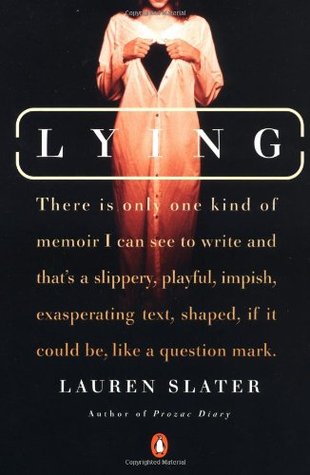
Lying
A Metaphorical Memoir
کتاب های مرتبط
- اطلاعات
- نقد و بررسی
- دیدگاه کاربران
نقد و بررسی

Starred review from January 3, 2000
If fact is shaded with metaphor, does it become fiction? In a memoir that raises that question, the author of Prozac Diary and Welcome to My Country narrates a life marked by a disease she may or may not actually have. "I have epilepsy," she writes in the first chapter. "Or I feel I have epilepsy. Or I wish I had epilepsy, so I could find a way of explaining the dirty, spastic glittering place I had in my mother's heart." But was it epilepsy, or depression, or bipolar disorder, or Munchausen syndrome, or none of the above? And did Slater really undergo a corpus callostomy operation separating her right and left brain? Questions of authenticity aside, at its core this memoir touchingly describes the coming of age of a young girl who relies on illness to gain the attention of her narcissistic mother and ineffectual father, and who must find a way to navigate her parents' often vicious marriage and her own troubled adolescence. Slater, who says she must take anticonvulsant medication daily, had her first seizure the summer she turned 10. The symptoms of epilepsy function as a vehicle for her most potently written passages: dazzling hallucinations, teeth-grinding spasms, exuberant exaggerations. As often happens to those with illness, Slater moves from diagnosis to misdiagnosis to cure to redefinition and eventually to acceptance. In her afterword, the author explains that for personal and philosophical reasons, she had no choice but to transcribe her life in "a slippery, playful, impish, exasperating text, shaped, if it could be, like a question mark." The skill with which she achieves her goal reflects unusual insight. Agent, Kim Witherspoon.

May 15, 2000
Slater, author of "Prozac Diary" (1998), marshals her literary virtuosity and dual perspective as a psychologist who has suffered mental disorders in this highly provocative inquiry into the nature of epilepsy. She describes her own epileptic seizures with poetic intensity, then declares that "some epileptics are liars," and, indeed, many episodes feel more dramatized than documented. She lyrically recounts her spiritual awakening at a special school for epileptics run by nuns only to slyly observe that epileptics often harbor religious fixations. Slater then suggests that she actually had Munchausen syndrome, which induces sufferers to feign illnesses. Did she have an operation to separate the hemispheres of her brain, or is that a metaphor for her divided sense of self? Each anecdote is as enrapturing and disorienting as the auras, or "strange states," she experiences just before her seizures, and all are inspired by the same overarching question: Why is what we feel less true than what is? Slater's uncanny narrative subtly reveals the meshing of the factual with the emotional and the real with the imagined. ((Reviewed May 15, 2000))(Reprinted with permission of Booklist, copyright 2000, American Library Association.)

























دیدگاه کاربران